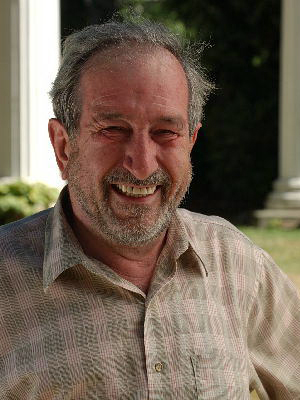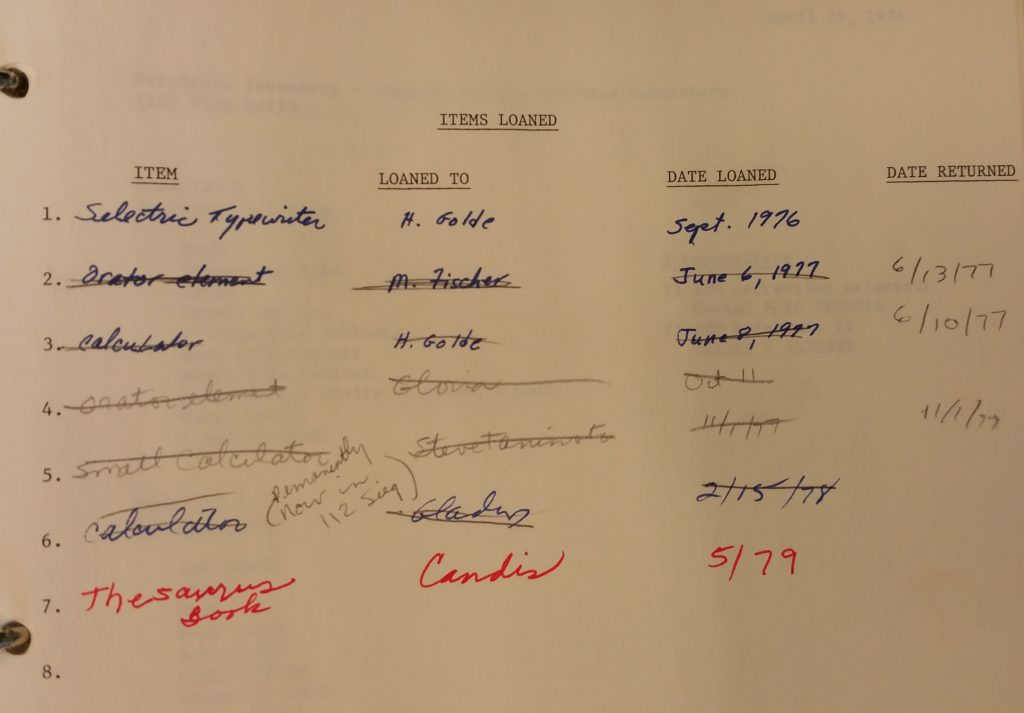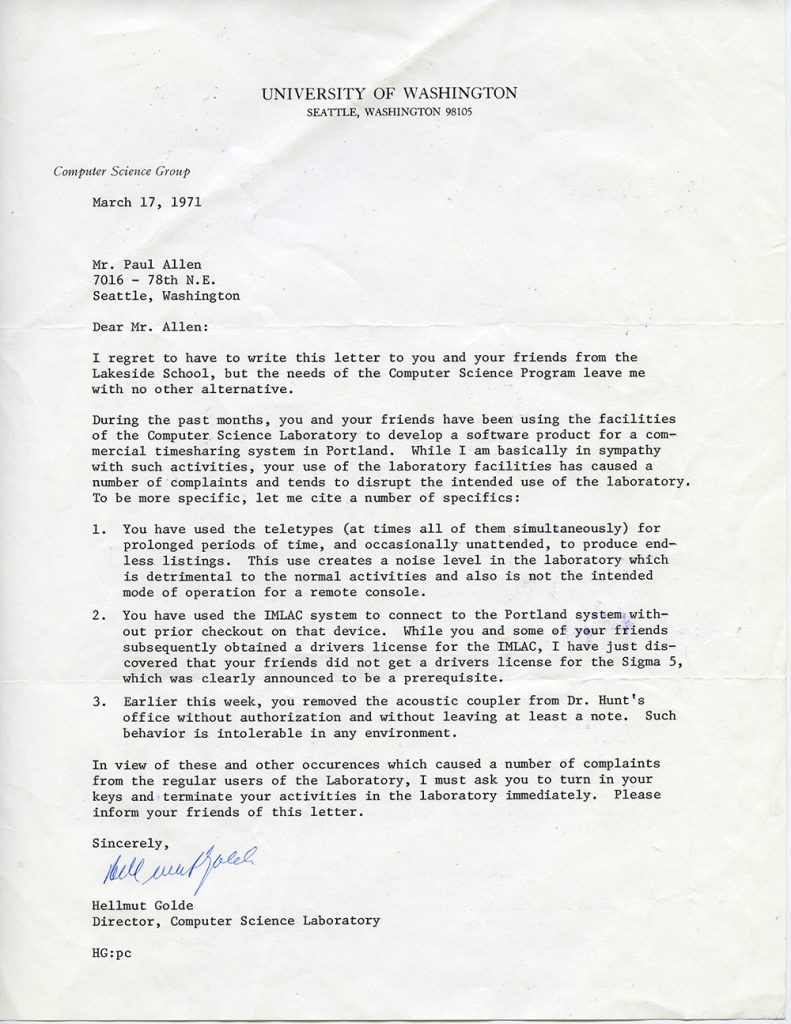
The Allen School family is mourning the loss of our friend and colleague Hellmut Golde, who passed away earlier this month after a brave battle against cancer. As one of the founding members of the Computer Science Group at the University of Washington and leader of the team that developed the wildly successful VAX Pascal compiler, Golde’s legacy includes the emergence of the Paul G. Allen School of Computer Science & Engineering as an education and research powerhouse and the emergence of the Seattle region as a hub of computing innovation.
Golde, who grew up in Germany, joined the UW faculty in 1959 as a professor in the Department of Electrical Engineering after earning his Ph.D. from Stanford University. He was one of the founders of the Computer Science Group in 1967, the precursor to the Department of Computer Science, formed in 1974, which evolved into the Department of Computer Science & Engineering in 1989 and eventually into the Paul G. Allen School in 2017. In those early days, Golde played a crucial role in establishing the culture for which the Allen School is widely known — one of friendship, support, and community.
A few years after he helped lead the creation of the Computer Science Group, Golde became director of the Computer Science Laboratory, the research and educational facility that hosted a couple of aspiring computer scientists, Paul Allen and Bill Gates, in the days before they set out to put a computer on every desktop. Back then, the pair would sneak into the lab and “borrow” computer time, as Gates would later describe it. Golde would cement his place in campus lore by famously expelling Allen and Gates from the lab.
Delivering his rebuke via a polite yet sternly worded letter, Golde directed Allen to “turn in your keys and terminate your activities” owing to offenses such as “you removed the acoustic coupler from Dr. Hunt’s office without authorization and without leaving at least a note.” At the celebration of the naming of the Allen School more than 40 years later, Allen astonished Golde and the rest of the audience by pulling out the letter and reading it in its entirety as he reminisced about his long-standing affection for UW. Allen subsequently framed two copies of Golde’s letter as mementos for the school and for Golde, while we attempted to make amends for the decades-old rebuke by gifting Allen an acoustic coupler purchased on eBay.
Professor emeritus Richard Ladner, who joined the department in 1971, fondly recounted the ease with which Golde bridged the divide in their academic interests and became not only a colleague but lifelong friend. “Hellmut was one of the first people I met when I interviewed for a faculty position at the University of Washington. We were miles apart in terms our academic interests, me a mathematician and he an electrical engineer,” Ladner recalled. “Nonetheless, we hit it off because of his infectious sense of humor and overall kindness. Some of my fondest memories of days with Hellmut are skiing with him and his family at Alpental, Mount Baker, Stevens Pass, and Big Sky. It was always hard for me to keep up with him on the slopes.”
Golde later stepped in to serve as acting chair of the department from 1976 to 1977. It was a period of transition for our program, and Golde wasn’t given much of a choice in the matter — the first department chair, his dear friend Jerre Noe, had declared himself a sabbatical after coming to the realization that if he didn’t leave town, he might wind up being chair for life. At the time, the department had a grand total of 11 faculty and had graduated 25 students.

As Golde was completing his time as chair, Ed Lazowska arrived to join the UW faculty one week after completing his Ph.D. — and just one week before the start of the school year. His new colleagues tried to reassure him that he didn’t need to worry, because “the course you’ve been assigned has been taught for many years by Hellmut Golde. He’s the best teacher in the department. Ask him for his notes.” Unfortunately for Lazowska, “Hellmut was such a good teacher that those ‘notes’ consisted of a single page, with a single line for each day of the course specifying the topic to be covered that day,” Lazowska laughed. “Let’s just say that my course evaluations were not as good as Hellmut’s had been.”
Although Golde’s time at the helm was short-lived, he had an outsize impact on the program beyond the recruitment of Lazowska and Ladner — each of whom went on to have an outsize impact of their own on the growth of our program and on our emergence as a leader in accessible computing, respectively. In October 1977, Digital Equipment Corporation (DEC) introduced the VAX-11/780 computer, which became the mainstay of many computer science departments and companies nationwide. UW managed to acquire an early VAX on the understanding that Golde and a group of graduate students would write a VAX compiler for the Pascal programming language, which was widely used for introductory programming.
“DEC was willing to give Hellmut a portion of sales for the VAX Pascal compiler because they greatly underestimated the demand for Pascal and the market for the VAX computer in education,” explained Allen School Director Hank Levy, who was a member of DEC’s VAX design and development team at the time. “Partly as a result of the compiler that Hellmut and his team built, the VAX become highly successful in educational institutions, resulting in more than $1 million in royalties flowing from DEC to the department — a not insignificant sum in those days. These funds were crucial in allowing the department to grow during difficult financial times on campus. It was Hellmut’s foresight, technical acumen, and generosity which allowed the department to preserve its momentum — and later, to climb into the ranks of the top 10 computer-science programs in the nation.”

The VAX-11/780 computer on display in the Allen Center atrium stands as a monument to those days, when this single computer could support the entire department’s computing needs.
As Ladner noted, Golde enjoyed a good joke — even if it came at his own expense. He was particularly amused at people’s inability to reckon with the pronunciation of his German name. “Hellmut used to display on his office door a montage of address labels from letters people sent him on which his name had been butchered,” recalled Lazowska. “He would say ‘Hellmut Golde’ on the phone, and often the person on the other end wouldn’t get it quite right. My personal favorite was the time someone addressed a letter to ‘Hal McGoldy.’”
Always a leader and forever a friend, Hellmut retired from UW as emeritus professor in 1992 but remained actively engaged with his Allen School family. We miss him greatly.
A celebration of Hellmut’s life will be held on Sunday, June 2, 2019 at 2 pm at the Bill & Melinda Gates Center for Computer Science & Engineering at the University of Washington. Please contact Beth Golde (beth at golde.org) for details if needed. Remembrances, in lieu of flowers, may be made to the Hellmut Golde Endowed Scholarship in Computer Science & Engineering at the University of Washington, or the Golde Family Scholarship Fund at Heritage University.
An official obituary may be found here. Photographs of Hellmut through the years may be found here.


